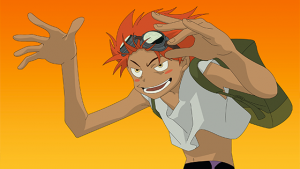Assassination Classroom: Child’s Play
by Protto

My face when watching Assassination Classroom.
You’ve probably figured it out by now, but I don’t particularly care for this show. I don’t like it at all, in fact, and I’ve never made that a secret. Any one of the five people who haven’t muted me on Twitter can tell you I don’t have any love for this series. And sure, I can sit here and sneer and make a show of being as scathing as possible, but that’s all it is: a show. I don’t hate it. The strongest emotion I can realistically muster for this series is mild exasperation. I’ve even smiled once or twice when watching it. But perhaps that’s my main gripe with Assassination Classroom as a whole:
It’s boring. That’s all it is.
Seeing such an out-there premise be dragged down kicking and screaming by its own lackluster execution is truly a sight to behold. But I guess that’s always been anime’s long-lived curse, hasn’t it? How many times must we watch as a show shoots itself in the foot with its inherent lack of vision? What’s that you say? A famous, legendary hero has to ally himself with his sworn demonic enemy and right the world diplomatically rather than with swords and sorcery? Well, make sure the demon king is actually a cute, hot girl. With big tits. No, no, bigger tits! That’s the ticket! There are harem elements to it, too, right? Good. Oh, what’s this? A war between humans and vampires? Okay, but sneak a high school in there just to be sure. Aha, a weird candid alien is going to destroy the world in one year’s time? Eh, as long as he plays nice with a group of middle school students, it’s all good. Come on. Can you think of a better way to cripple your own creativity?
And like I said, the show isn’t even funny. It has one joke, and the gist of it is that everyone takes trying to murder this world-ending creature in stride, even the world-ending creature himself. In fact, he encourages it! All the other visual gags are pretty much in service to that one recurring joke. Very wacky, guys. But at least it does well in lightening the mood after treating us to all those heavier, dramatic moments… right? Well…
Let’s focus in on our main character for a moment. Meet Nagisa Shingetsu:
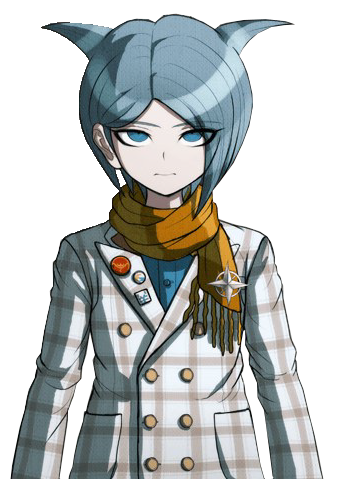
He also doubles as our narrator. It is through his perspective that we are told how events unfold in the anime. Nagisa is, essentially, the periscope through which we find ourselves gazing at the anime landscape. That’s the extent of his job, really. He doesn’t do much else. Like Vaan of Final Fantasy XII, his most useful role is as a viewpoint for the audience to vicariously witness the story as it comes. Predictably, our hero is meek, shy, diminutive, and passive. Oh, I’m sure he’ll shape up eventually. I’m sure, once the dust has settled, he’ll even open up about some personal weaknesses, doubts, family trouble, etc., but for now, this is where he stands. Therefore, as an unassuming, diffident Japanese shounen, it falls to his narrow shoulders to watch most of the goings-on occur to those around him.
You know, I also remember being a shy middle school student. I remember lacking confidence and going with the flow more often than not. And most importantly, I remember being intimidated by this new environment that demanded more independence and responsibilities than I was used to being afforded. Keep in mind that we are meant to step into Nagisa’s shoes. He is an uncertain young boy forced into assassination training (puberty), thrust into Class-3E, a class for supposed delinquents and underachievers (did you not also feel like an outcast when you first entered junior high, so very different from your elementary school days?), given the task of killing Koro-sensei (new responsibilities), and all the while, feeling as if all the exciting events are happening to others instead of him directly (which is a sentiment I’m sure we’re all familiar with). I’m reminded of the Richard Linklater film, Boyhood. Or, more accurately, RedLetterMedia’s review of Boyhood.
And that’s really my underlying issue with Assassination Classroom: it’s childish. It’s the sort of immaturity that shackles it down and prevents me from taking a shine to the whole thing. I’m expected to be this kid watching other kids doing kiddy things. Of course, I’m not saying kids in a show are inherently bad. And, of course, there’s always a certain charm in watching young characters develop and come in to their own. But those shows are usually written from a higher vantage point, i.e. an older, experienced person with the perspective to shed light on the dilemmas youngsters face. You don’t play Persona 4 (Golden) as Nanako, do you?
What kind of drama are you allowed to even see in Assassination Classroom, anyway? Oh, what a shy chick makes up for in chemistry, she lacks in the socializing department. So what does she do? She tries flat-out telling Koro-sensei to poison himself with her chemicals, duh! Hey, a really prim and proper girl used to blow off some steam back in elementary school by… dressing up and going to the arcade instead of studying. And that’s why she landed herself in the losers’ class! Well shit, ain’t got time for that, scarlet letter for the rest of your educational career, ya harlot! Well, I guess it’s up to Koro-sensei to strut his stuff. Time to trick the shy girl into mixing up a compound that I say is poison but will actually grant me more special powers! You’ll learn how important proper socializing is that way! And proper girl, you’ll learn to move forward from your dark past once I save you from those hoodlums! This is profound character growth, y’see.
But even more absurd is the way Class-3E is treated by the rest of the school, including the faculty. Are you seriously expecting me to believe the administrators are so malicious that they deliberately encourage segregation and bullying? Yo, if you dislike these students that much, just expel them! You are a prestigious academy, aren’t you? But no, the principal’s anime-mastermindy logic is that this will effect the worker ant theory, which, according to him, paints one group of undesirables so unfavorably that they will serve as a cautionary example to the school’s other students and drive them to work harder. And he makes it a top priority that this system stays in place. You see?! I, a fertile young mind filled to the brim with untapped potential, am being oppressed by the system! We’re the underdogs, y’all! I’m not a sociologist or anything, but from what I’ve read, the worker ant theory seemed more to acknowledge that every society will have its share of both slackers and overachievers, NOT that the slackers will motivate others to succeed. Plus, how exactly does this support your strategy to keep your college acceptance ratings up, when one of your classes is apparently so terrible that they repeatedly flunk their tests? I imagine that’d still leave a considerably ugly stain on your record.
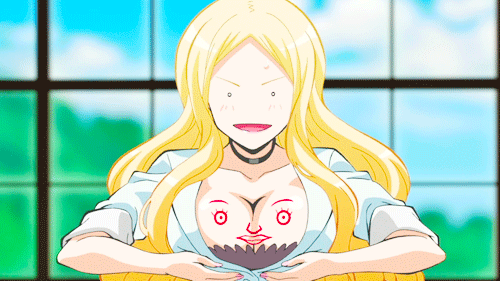
And,once again, we’re missing that higher vantage point. We lack that shrewder, adult outlook within the narrative to distance ourselves from all the schmaltz. As if it wasn’t enough that we have to suffer through these kids’ melodrama, we also have to sit through the childlike problems of the teachers, as well. The hot blonde teacher, for instance, who calls herself a master assassin but never does anything remotely masterful during her assassination attempts. It’s hubris! Adults are too prideful and simply want to show up us kids! That’s why she failed! Yeah, man, I’m always looking to outperform those punks in my local middle school. Sometimes I just walk into the middle of class and flaunt my college grades in their faces. That’ll show ‘em who’s boss!
Then there’s this fool:
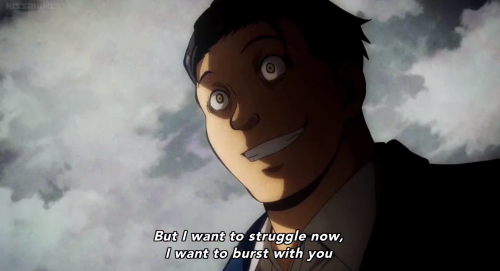
…who seems chummy on the outside and likes to be called “Dad.” Why, any middle school-aged kid would be suspicious of a grownup trying to act cool and hip. They want to be treated like adults, remember! To no one’s surprise, he turns out to be shallowly crazy evil, somehow getting to his position even with all those pesky military psych evaluations in place. It’s like a reflection of a teenager’s view of their real life fathers. “Dad,” who tries to “get with it” and crowd in on his children’s lives, is then met with hostility when he punishes his kids for misbehaving. Not to worry, though. Our protagonist, Nagisa, has had a hidden special talent all along. See, he has a knack for being an assassin, so he never needed his crazy evil “Dad’s” training in the first place. He’ll beat him at his own game! That’ll stick it to him! Uh-huh, right. There’s just something very juvenile about this entire show.
In fact, Koro-sensei himself is very juvenile. You can imagine your younger self dreaming this sort creature up, can’t you? A super awesome, crazy-looking alien that can do anything! Wait, no, he’s actually a science experiment gone wrong! He’s cool, though, and listens to your problems. He’ll even want to solve them for you! Get mad at him if you want, he won’t mind. And he’s got super strength! Huh? You can launch bombs at him? W-well, he can shed his skin and use it as a shield! What do you mean he has a weakness to water? Nuh-uh, he secretes a special mucus that makes him impervious long enough to get away! Wait, an all-out ambush attack? Um… You know what, he can also go really fast. Like Mach 15—no, 20! If all his other abilities fail, he can always rely on his super speed! So there.
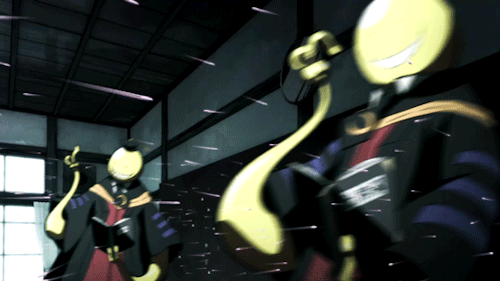
But if he’s that amazing, wouldn’t he be able to solve all his students’ problems too quickly? How right you are. Why do you think we devote so many episodes to nothing but those poorly thought out assassination plots that are prone to fail? And additionally, why do you think we keep having new characters pop up out of nowhere, despite the fact that the show already started off with thirty-odd characters to begin with? I mean, these characters always fizzle out when push comes to shove, no matter how elaborately thought out the show tells us their plans are. Sure, some of them return once – maybe twice if they’re lucky – later on to stretch things out further, but we’re likely never to see them again beyond that. Why? Because most of them are cheap filler.You know how it goes. Eventually, the series will end, but whether or not Koro-sensei survives is irrelevant. He may die, but we have to wait until the finale to see that. And we’ll only ever get there once he caters to all his students in Class-3E and wraps up their personal issues in a neat little bow. Everything else is predominantly filler.
That’s why the show feels so unfocused. It’s like a child with ADHD who eagerly pulls its parents (the viewer) by the hand to go on every single ride in Disneyland to extend the family trip.
It’s just child’s play.
Therefore, if the so-called drama is dull as dishwater, it must then follow that the humor should step up to fill in. But wait, haven’t we already established that—
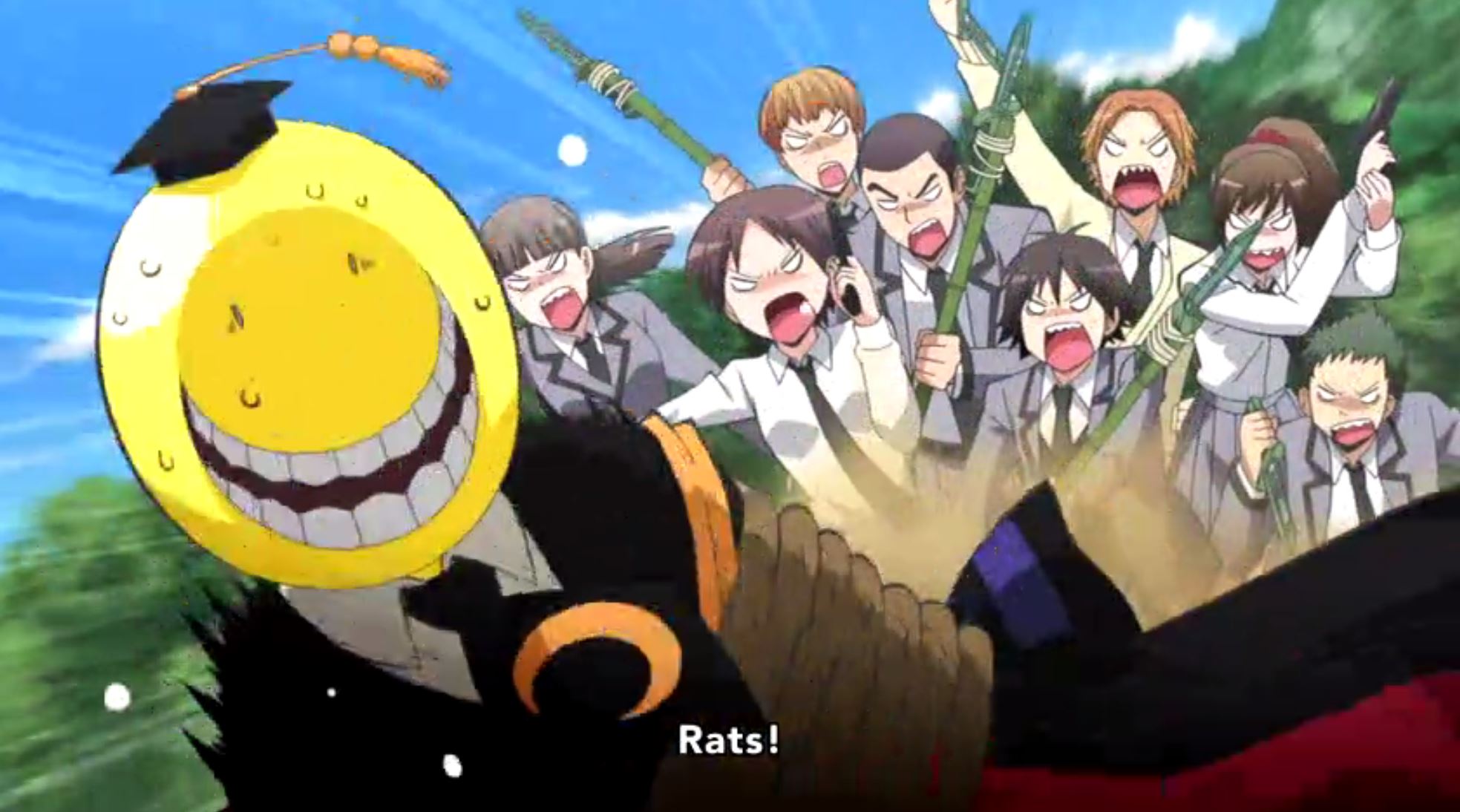
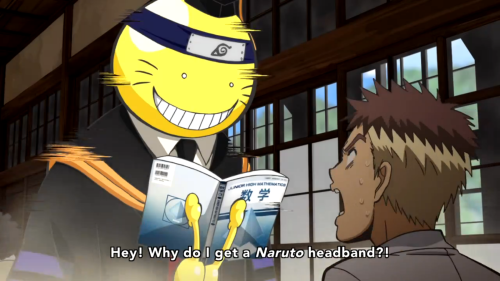
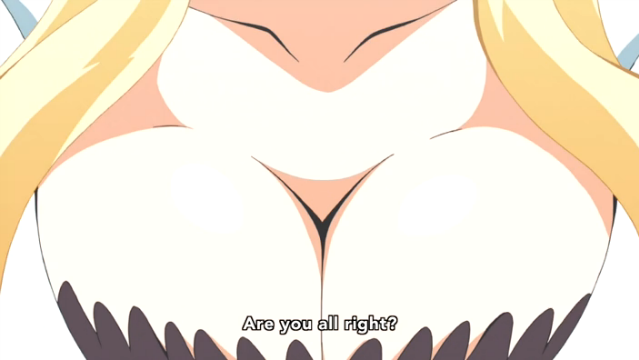
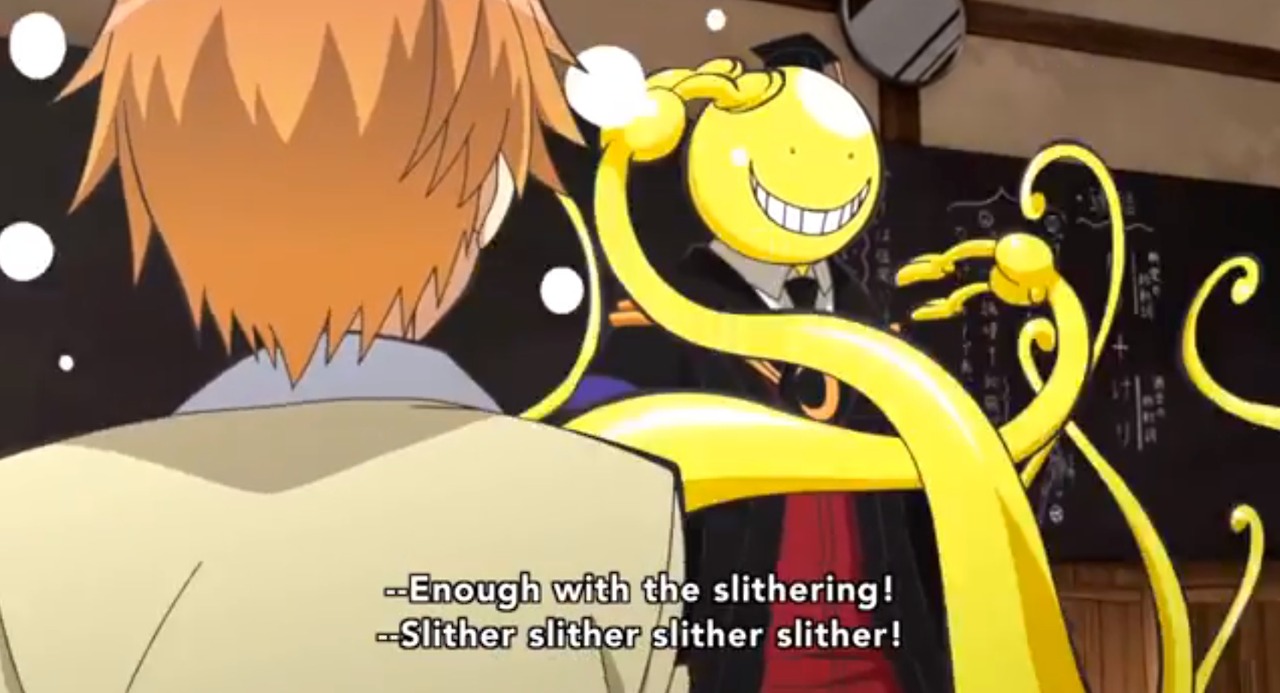
Oh.
I’m not even saying that every single thing about Assassination Classroom is that laughably inept. Like I mentioned earlier, I’ve smiled once or twice. But it’s like a little kid who uses the potty for the first time. When the show does something mildly amusing, it’s a big accomplishment. Fiiine, I’ll allow myself to be amused. I’ll allow myself to be impressed. Gold star, AC. Keep up the good work!
But then why do all these adults like Assassination Classroom so much? And no, it’s not because they’re manchildren. Is it because they’re reminded of their younger selves? Maybe they’re charmed by the series’ simplicity, like any simple show can find a more mature audience. Or maybe they just really do find it entertaining. I don’t know.
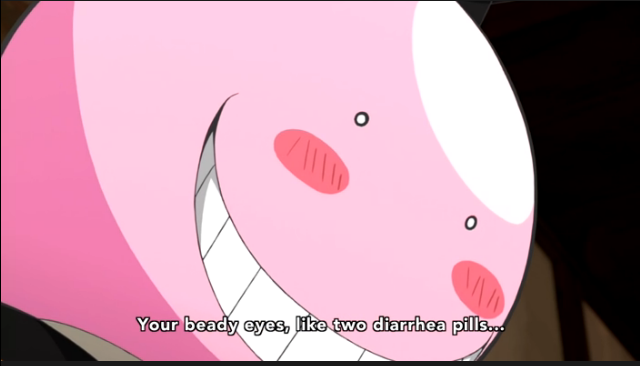
Meh.Whatever.


